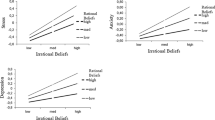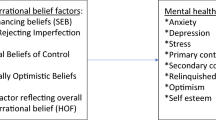Abstract
Irrational beliefs are the focus of many psychological theories, since research has shown that holding irrational beliefs often leads to unhealthy emotions, dysfunctional behaviors, and psychological disturbances. The aim of such therapies as rational emotive behavioral therapy and cognitive behavioral therapy is to dispute irrational beliefs to promote more rational ways of thinking; however they do not take into account individual personality differences. The aim of this study was to determine whether personality traits predict rational and irrational beliefs in a mixed student and clinical sample. It was hypothesized that the domains of the five factor model of personality would predict rational beliefs as well as a range of irrational beliefs. Our findings supported the hypothesis, showing distinct associations between personality traits and each specific irrational belief. Neuroticism predicted rational beliefs as well as six out of the seven types of irrational beliefs measured. Additionally, extraversion predicted rationality and self-downing, openness predicted need for comfort and total irrationality, and conscientiousness predicted need for achievement and demand for fairness. Agreeableness did not predict any type of rational or irrational beliefs. Knowledge of these distinct relationships may increase a clinician’s ability to conceptualize a therapy case and determine the best approach to treatment.
Similar content being viewed by others
References
American Psychiatric Association. (2000). Diagnostic and statistical manual of mental disorders (4th ed., text rev.). Washington, DC: Author.
Bagby, R. M., Quilty, L. C., Segal, Z. V., McBride, C. C., Kennedy, S. H., & Costa, P. T. (2008). Personality and differential treatment response in major depression: A randomized controlled trial comparing cognitive-behavioural therapy and pharmacotherapy. Canadian Journal of Psychiatry, 53, 361–370.
Blau, S., Fuller, J. R., & Vaccaro, T. P. (2006). Rational-emotive disputing and the five-factor model: Personality dimensions of the Ellis emotional efficiency inventory. Journal of Rational-Emotive & Cognitive Behavior Therapy, 24, 87–100.
Brown, C. M., Dowd, E. T., & Freeman, A. (2010). Rational and irrational beliefs and psychopathology. In D. David, S. J. Lynn, & A. Ellis (Eds.), Rational and irrational beliefs: Research, theory, and clinical practice (pp. 149–172). New York, NY: Oxford University Press.
Castellanos-Ryan, N., & Conrod, P. (2011). Personality correlates of the common and unique variance across conduct disorder and substance misuse symptoms in adolescents. Journal of Abnormal Child Psychology, 39, 563–576.
Cattell, R. B., Eber, H. W., & Tatsuoka, M. M. (1970). Handbook for the sixteen personality factor inventory. Champaign, III: IPAT.
Cattell, H. E. P., & Mead, A. D. (2008). The sixteen personality factor questionnaire (16PF). In G. Boyle, G. Matthews, & D. Saklofske (Eds.), The SAGE handbook of personality theory and assessment (Vol. 2, pp. 135–160)., Personality measurement and testing London: SAGE Publications Ltd.
Conrod, P. J., Castellanos-Ryan, N., & Mackie, C. (2011). Long-term effects of a personality-targeted intervention to reduce alcohol use in adolescents. Journal of Consulting and Clinical Psychology, 79, 296–306.
Conrod, P. J., O’Leary-Barrett, M., Newton, N., Topper, L., Castellanos-Ryan, N., Mackie, C., & Girard, A. (2013). Effectiveness of a selective, personality-targeted prevention program for adolescent alcohol use and misuse. JAMA Psychiatry, (Epub ahead of print).
Conrod, P. J., Stewart, S. H., Comeau, N., & Maclean, A. M. (2006). Efficacy of cognitive-behavioral interventions targeting personality risk factors for youth alcohol misuse. Journal of Clinical Child and Adolescent Psychology, 35, 550–563.
Costa, P. T., & McCrae, R. R. (1988). Personality in adulthood: A six-year longitudinal study of self-reports and spouse ratings on the NEO personality inventory. Journal of Personality and Social Psychology, 54, 853–863.
Costa, P. T., & McCrae, R. R. (1992). Revised NEO personality inventory (NEO PI-R) and NEO five-factor inventory (NEO-IFF). Odessa, FL: Psychological Assessment Resources Inc.
Costa, P. T., & McCrae, R. R. (1995). Domains and facets: Hierarchical personality assessment using the revised NEO personality inventory. Journal of Personality Assessment, 64, 21–50.
Davies, M. F. (2006). Irrational beliefs and unconditional self-acceptance. I. Correlational evidence linking two key features of REBT. Journal of Rational-Emotive & Cognitive-Behavior Therapy, 24, 113–124.
Davies, M. F. (2008). Irrational beliefs and unconditional self-acceptance. II. Experimental evidence linking two key features of REBT. Journal of Rational-Emotive & Cognitive-Behavior Therapy, 26, 89–101.
Ellis, A. (1995). Thinking processes involved in irrational beliefs and their disturbed consequences. Journal of Cognitive Psychotherapy, 9, 105–116.
Ellis, A., David, D., & Lynn, S. J. (2010). Rational and irrational beliefs: A historical and conceptual perspective. In D. David, S. J. Lynn, & A. Ellis (Eds.), Rational and irrational beliefs: Research, theory, and clinical practice (pp. 3–22). New York, NY: Oxford University Press.
Farnam, A., Farhang, S., Bakhshipour, A., & Niknam, E. (2011). The five factor model of personality in mixed anxiety-depressive disorder and effect on therapeutic response. Asian Journal of Psychiatry, 4, 255–257.
Faustino, L. L. (2012). Five-factor personality traits of recovered bipolar patients and first degree relatives. Dissertation Abstracts International: Section B: The Sciences and Engineering, 72, 6381.
Forman, B. D., & Forman, S. G. (1978). Irrational beliefs and personality. Journal of Personality Assessment, 42(6), 613–620.
Gore, W. L., & Widiger, T. A. (2013). The DSM-5 dimensional trait model and five-factor models of general personality. Journal of Abnormal Psychology,. doi:10.1037/a0032822. Advance online publication.
Gorman, B. S., & Simon, W. E. (1977). Personality correlates of rational and irrational beliefs. Rational Living, 12, 25–27.
Gough, H. G., & Heilbrun, A. B. (1965). The adjective check list. Palo Alto: Consulting Psychologists Press.
Hooten, W. M., Wolter, T. D., Ames, S. C., Hurt, R. D., Vickers, K. S., Offord, K. P., et al. (2005). Personality correlates related to tobacco abstinence following treatment. The International Journal of Psychiatry in Medicine, 35, 59–74.
Jones, R. G. (1968). A factored measure of Ellis’ irrational belief system with personality and maladjustment correlates. Dissertation Abstracts International, 29, 4379B–4380B.
Kassinove, H., Crisci, R., & Tiegerman, S. (1977). Developmental trends in rational thinking: Implications for rational-emotive, school, mental health programs. Journal of Community Psychology, 5, 266–274.
Linder, H., Kirkby, R., Wertheim, E., & Birch, P. (1999). A brief assessment of irrational thinking: The shortened general attitude and belief scale. Cognitive Therapy and Research, 23, 651–663.
Macavei, B., & McMahon, J. (2010). The assessment of rational and irrational beliefs. In D. David, S. J. Lynn, & A. Ellis (Eds.), Rational and irrational beliefs: Research, theory, and clinical practice (pp. 115–148). New York, NY: Oxford University Press.
Mayhew, R., & Edelmann, R. J. (1989). Self-esteem, irrational beliefs and coping strategies in relation to eating problems in a non-clinical population. Personality and Individual Differences, 10, 581–584.
McCrae, R. R., & Costa, P. T., Jr. (1987). Validation of the five-factor model across instruments and observers. Journal of Personality and Social Psychology, 52, 81–90.
McCrae, R. R., & Costa, P. T., Jr. (2008). Empirical and theoretical status of the five-factor model of personality traits. In G. J. Boyle, G. Matthews, & D. H. Saklofske (Eds.), The SAGE handbook of personality theory and assessment (Vol. 1, pp. 273–294)., Personality theories and models London, England: SAGE Publications Ltd.
Newmark, C. S., Frerking, R. A., Cook, L., & Newmark, L. (1973). Endorsement of Ellis’ irrational beliefs as a function of psychotherapy. Journal of Clinical Psychology, 29, 300–302.
Rector, N. A., Bagby, R. M., Huta, V., & Ayearst, L. E. (2012). Examination of the trait facets of the five-factor model in discriminating specific mood and anxiety disorders. Pyschiatry Research, 199, 131–139.
Riggs, S. A., & Han, G. (2009). Predictors of anxiety and depression in emerging adulthood. Journal of Adult Development, 16, 39–52.
Roose, A., Bijttebier, P., Claes, L., Lilienfeld, S. O., DeFruyt, F., & Decuyper, M. (2012). Psychopathic traits in adolescence and the five factor model of personality. Journal of Psychopathology and Behavioral Assessment, 34, 84–93.
Rosellini, A. J., & Brown, T. A. (2010). The neo five-factor inventory: Latent structure and relationships with dimensions of anxiety and depressive disorders in a large clinical sample. Assessment, 18, 27–38.
Rosenthal, R., & Rosnow, R. L. (2009). The volunteer subject. In R. Rosenthal & R. L. Rosnow (Eds.), Artifacts in behavioral research (pp. 48–92). New York, NY: Oxford University Press.
Sava, F. A. (2009). Maladaptive schemas, irrational beliefs, and their relationship with the five-factor personality model. Journal of Cognitive and Behavioral Psychotherapies, 9, 135–147.
South, S. C., Eaton, N. R., & Krueger, R. F. (2010). The connections between personality and psychopathology. In T. Millon (Ed.), Contemporary directions in psychopathology: Scientific foundations of the DSM-V and ICD-11 (pp. 242–262). New York, NY: Guilford Press.
Spörrle, M., Strobel, M., & Tumasjan, A. (2010). On the incremental validity of irrational beliefs to predict subjective wellbeing while controlling for personality factors. Psicothema, 22, 543–548.
Watt, M. C., Stewart, S. H., Conrod, P. J., & Schmidt, N. B. (2008). Personality-based approaches to treatment of co-morbid anxiety and substance use disorder. In S. H. Stewart & P. J. Conrod (Eds.), Anxiety and substance use disorders: The vicious cycle of comorbidity (pp. 201–219). New York, NY: Springer Science + Business Media.
Widiger, T. A., & Smith, G. T. (2008). Personality and psychopathology. In O. P. John, R. W. Robins, & L. A. Pervin (Eds.), Handbook of personality, third edition: Theory and research (pp. 743–769). New York, NY: Guilford Press.
Author information
Authors and Affiliations
Corresponding author
Rights and permissions
About this article
Cite this article
Samar, S.M., Walton, K.E. & McDermut, W. Personality Traits Predict Irrational Beliefs. J Rat-Emo Cognitive-Behav Ther 31, 231–242 (2013). https://doi.org/10.1007/s10942-013-0172-1
Published:
Issue Date:
DOI: https://doi.org/10.1007/s10942-013-0172-1




